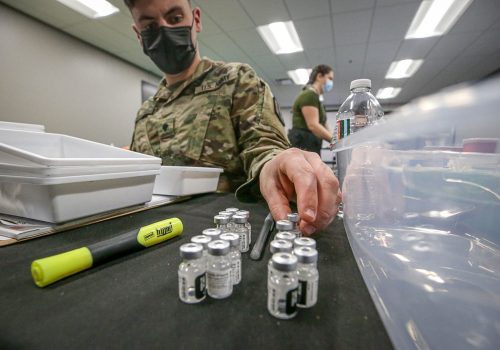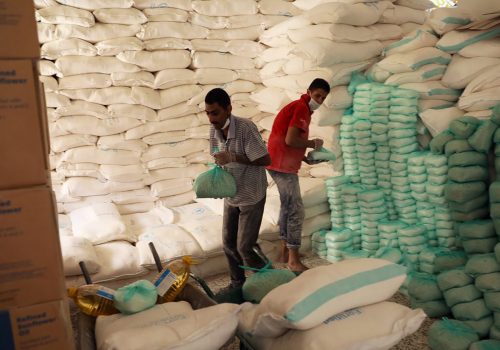The future is here: A guide to the post-COVID world 04/09/2021
Welcome to your guide to where the world is headed during the pandemic era and beyond, from Andrew Marshall. Each week, we’ll bring you the latest and most significant expert insights and international news about how coronavirus is reshaping international affairs. To stay updated each week, sign up to the newsletter here.
Let’s take a spin around the globe, in seven minutes or less.
In top stories this week:
- Why Brazil’s latest COVID-19 wave is “a biological Fukushima”
- Some countries are stopped at a red light on the road to recovery, while some are hopping on the freeway
- What vaccine hesitancy among US troops means for national security
- But first…
The big story
This week’s key theme: Entrepreneurs are making use of the time on their hands
Spring has sprung across much of the United States, and there are signs of new growth everywhere: in back yards and parks—and in the startup market.
There has been much terrible news in the last year—for individuals, families, communities, and companies—but also some encouraging signs. One bright spark is that many new businesses have sprung up.
The increase in new startups in the United States was startling, and analysts are still trying to understand it. “After cratering by 30% in the weeks following the March lockdowns, paperwork filed by prospective businesses started growing in June [2020] and finished the year ahead of 2019’s tally by almost a quarter,” says Bloomberg. The figures were comparable in some other countries too—in the United Kingdom, a new tech company was created every half-hour in 2020.
Not every one was the next Google. Much of the new business growth was driven by individuals seeking another way of making money in a crisis or a side hustle. In the United Kingdom, many of the startups were (unsurprisingly) home-baking businesses. But, notes the Economic Innovation Group, “there was still a noticeable increase in high-propensity business applications as well. These likely employer applications—up 15.5 percent from 2019 and 22.9 percent above their 2010-19 average—are particularly important because they represent the applications for businesses most likely to lead to lasting job growth and innovation.”
That wave of entrepreneurship is visible in many big US regional and city economies, especially across the east of the country. Some of the startups were in retail, moving online because that was the only place to go. Other vibrant sectors were digital: fintech, e-commerce, gaming, and telemedicine. These sectors were growing before—and suddenly, because of the pandemic, people had time on their hands and the motivation to succeed.
If everything goes right, there is money there for the right ideas thanks to a booming venture capital sector and low interest rates. “Although most industry watchers expected the COVID-19 pandemic to take a toll on the venture capital industry, 2020 turned out to be a boom year for the sector,” says MIT’s Sloan School of Management, which added that some experts argue “it’s a lot easier to start a tech company now than it was just 10 years ago because all of the fundamental building blocks are available.”
Wired quotes one large venture-capital firm’s advice: “Now is the time to start stepping on the gas,” it says, and the tech magazine predicts a “hot startup summer.”
For many who lost their jobs last year, new fintech startups won’t help. The jobs that have gone are ones in non-skilled sectors like retail, entertainment, leisure—and many won’t come back. And which of those home bakeries will still be there by the end of the year?
A full recovery will demand more finance, policy shifts, government support—and for those startups to move into a higher gear in which they start growing and recruiting. But it’s an intriguing pattern and worth watching.
Subscribe to The future is here: A guide to the post-COVID world
Sign up for a weekly roundup of top expert insights and international news about how coronavirus is reshaping international affairs.

The world in brief
Insights from across the planet, in ten bullets or fewer
- Brazil entered a deadly surge. COVID-19 deaths in Brazil have passed a grim benchmark: four thousand in a day. The total death toll, at 337,000, is behind only the 555,000 dead in the United States and growing fast. A Brazilian doctor described the wave as “a nuclear reactor that has set off a chain reaction and is out of control.”
- A new leader for the United States’ global vaccination plan. The United States appointed Gayle Smith to head its vaccine diplomacy efforts and to help organize the flow of vaccines to countries which can’t afford them or otherwise don’t have access. Smith is a former US Agency for International Development administrator and chief executive of the ONE Campaign, an organization that advocates for overseas aid.
- The AstraZeneca vaccine saw additional setbacks this week. Several countries (including the United Kingdom) restricted the rollout of the AstraZeneca vaccine because of concerns about the risk of blood clots. The risk is very low, but issues with the vaccine and with the company’s communications have hindered the rollout and hampered national efforts around the world. Meanwhile, a new vaccine is entering clinical trials in Brazil, Mexico, Thailand, and Vietnam called NDV-HXP-S, one that would be easier to make and distribute if successful.
- The United Kingdom’s new testing philosophy: check it twice (per week). The United Kingdom plans to give everyone access to two rapid coronavirus tests a week, part of an effort to open the country up for normal business as soon as possible. UK Prime Minister Boris Johnson hopes non-essential shops can reopen and pubs and restaurants can start serving outdoors starting April 12.
- The rich will get richer. Developed economies like the United States, United Kingdom, and Europe should recover rapidly from coronavirus, the International Monetary Fund said in its World Economic Outlook. The Fund said the world economy would grow by 6 percent in 2021 and 4.4 percent in 2022 after shrinking by 3.3 percent in 2020. That’s an increase in its forecasts.
- But what about everyone else? Developing nations are behind in vaccinating their populations, which harms their economies, US Treasury Secretary Janet Yellen said in a speech to the Chicago Council on Foreign Affairs. That could mean a return to extreme poverty for many. “The result will likely be a deeper and longer-lasting crisis, with mounting problems of indebtedness, more entrenched poverty, and growing inequality,” she said.
The inside scoop
Insights from the Atlantic Council
Andrew Marshall is the Vice President of Communications for the Atlantic Council. He leads the Council’s media, digital, and editorial efforts, and coordinates the way the Council talks with its key communities.



